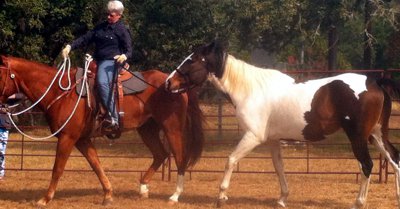A Holistic Look at Chronic Uveitis
Uveitis is also sometimes referred to as periodic ophthalmia or moon blindness. This condition is a chronic inflammation of the internal structures of the eye. Symptoms include pain, swelling, cloudiness of the cornea, pus in the anterior chamber of the eye, and contraction of the pupil. Initial episodes and subsequent flare-ups will often respond to steroids, non-steroidal anti-inflammatory drugs, and atropine, but relapse occurs within weeks to months after treatment is stopped. Each attack causes more damage to the eye, eventually leading to blindness. The inflammation generally starts in one eye but moves to the other eye, causing complete blindness.
Several causative factors have been suggested for anterior uveitis. Some horses with uveitis will have elevated titers to leptospira, an organism which affects cattle primarily. B-vitamin deficiency has also been considered. The bottom line is that this is an autoimmune disease which means the immune system is out of balance and is attacking the horse’s own eye tissue.
After many frustrating years of treating this condition with Western medicine, I have moved away from drugs to focus more on rebalancing the immune system. When I am consulted about a horse with an acute flare-up, my first focus is to control the pain and inflammation. I have had good results with a solution of half hypericum tincture and half calendula tincture diluted at the ratio of ten drops tincture to one ounce of water or saline solution. A gauze sponge is soaked with this solution and placed as a poultice over the eye. I do not try to get the solution into the eye directly. Horses seem to experience excellent relief with this treatment and will often lower their heads and become very relaxed. This application can be repeated four to six times a day. I find frequent attempts to force medications into the eye can cause more inflammation and create great resistance in the horse. An exception would be if the horse has an actual ulcer of the cornea that might require antibiotic treatment. Rather than using systemic non-steroidal anti-inflammatory agents, I have had some good success with B-L solution, which is a mixture of devil’s claw and yucca.
I also start these horses on a product from Standard Process called Oculotrophin. This product is made from eye tissue which has been treated to extract the antigen to which the immune system is reacting. The theory is that by feeding this protomorphogen, the immune system will be occupied with the eye antigen in the bloodstream and not attack the eye itself. Once the horse’s eye has had time to heal it will not continue to attract the immune system as it did when it was in constant inflammation. I find the Oculotrophin needs to be fed continuously for 6-12 months in some cases.
To address any nutrient deficiencies I feed large amounts of a SimplexityT product called Sprouts & Algae. This product is very high in beta-carotene and supplies the body with natural concentrated nutrients to make super-oxide dismutase – a potent anti-oxidant.
Once the acute flare-up has quieted down, I start with constitutional treatment to balance the immune system. I generally use homeopathy and take a full history to include other health issues that the horse has experienced. I suggest vaccinations be discontinued because they can trigger attacks by stimulating the immune system. I suggest blue-green algae be added to the diet because of its high chlorophyll. I warn owners to expect further flare-ups as this condition is very difficult to treat but the attacks should gradually become less frequent and less severe.
About the Author
Madalyn Ward, DVM, owns Bear Creek Veterinary Clinic in Austin, Texas. She is certified in Veterinary Homeopathy and Equine Osteopathy.
Memberships include American Veterinary Medical Association, American Association of Equine Practitioners, American Holistic Veterinary Medical Association, Texas Veterinary Medical Association and the Academy of Veterinary Homeopathy.
She has authored several books and publishes at her blog.
